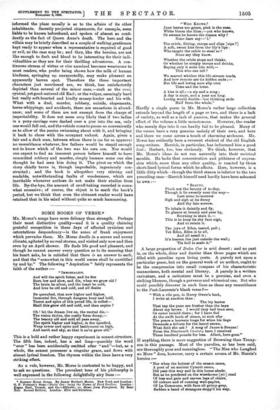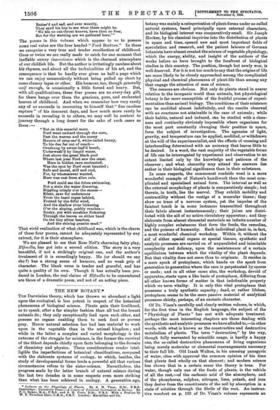SOME BOOKS OF VERSE.*
Ma. MoitsE's songs have more delicacy than strength. Perhaps their most distinctive quality—and it is a quality claiming grateful recognition in these days of affected cynicism and ostentatious despondency—is the sense of frank enjoyment which pervades them. Mr. Morse dwells in a serene and sunny climate, agitated by no real storms, and visited only now and then even by an April shower. He finds life good and pleasant, and though he cannot answer every question as to its meaning that his heart asks, he is satisfied that there is an answer to each, and that the "somewhat in this world amiss shall be unriddled by and by." The following " Aspiration " fairly represents the faith of the author :—
" IMMORTALITY.
And will the spirit falter, and its fire Burn low and slow, and die, when we grow old ? The brain be silent, and the heart be cold, And love be old and cold, and all desire
Be quenched, that now higher and higher, Immortal fire, through dungeon keep and hold, Turret and spire of this proud life, is rolled— Shall this grow old and cold, and then expire ?
Oh! let the dream live on, the mortal die,— The vision thrive, the costly form decay,— The beauty old and cold all pass away, The spirit higher and higher, in fire nprolled, Wrap tower and spire and battlement on high, And earth and sky, so that it ne'er grow old."
This is a bold and rather happy experiment in sonnet-structure. The fifth line, indeed, has a sad limp—possibly the word "ever" has been accidentally omitted after " and "—but, as a whole, the sonnet possesses a singular grace, and flows with almost lyrical freedom. The rhymes within the lines have a very striking effect.
As a rule, however, Mr. Morse is contented to be happy, and to ask no questions. The prevalent tone of his philosophy is well expressed in the following delightfully airy lines :—
• Bummer Haven Sonya. By James Herbert Morse. New York and London : 0. P. Putnam's Sons.—Oulu Cor : being the Poems of Ford Bolton. London : Regan Peel, Trench, and Co.—Blfinella; or, Home from Fairyland, By Boss Neil. Second Edition. London Ellis and Seriatim.
"WHO KNOWS?
June leaves are green, pink is the rose, White bloom the lilies ;—yet who knows,
Or swears he knows the reason why ? None dare say—' I.'
The oriole, flitting, stoops and slips [sips ?] A soft, sweet kiss from the lily's lips : Who taught the oriole to steal so ?
None say they know.
Whether the oriole stops and thinks,
Or whether he simply stoops and drinks, Saying only it suits him well,—
This who can tell ?
We marvel whither this life-stream tends, And how remote are its hidden ends ;- But life and loving soon slip over Time and the lover.
A kiss is all ;—a sip and a song ; A day is short, and a year not long. Loving would double—but thinking stole Half from the whole."
Hardly a single poem in Mr. Morse's rather large collection extends beyond the length of a page or two, and there is a lack of variety, as well as a lack of passion, that makes tho general effect of the volume a little monotonous. However, the reader who merely dips into it can hardly fail to be pleased. Many of
the verses have a very genuine melody of their own, and here and there we come across a touch of charming archness. Mr.
Morse has evidently been a reverent student of the old English song-writers. Herrick, in particular, has influenced him a good deal ; Herbert, too, less obviously. We think, however, that Mr. Morse's ideas do not run naturally into their metrical moulds. He lacks that concentration and pithiness of expres- sion which, more than any other quality, is exacted by those short-lined lyrical forms which he affects. Here, however, is a little ditty which—though the third stanza is inferior to the two preceding ones—Herrick himself need hardly have been ashamed to own :—
" BEAUTY.
Pluck not the beauty of to-day,
Though it lie sweetly near the way—
Lest some to-morrow Sigh and sigh at its decay And thy late sorrow.
To inhale it daintily and fly, To glance at beauty and pass by,
Scorning to stain it,—
This is to keep its shy face nigh, And to retain it.
The joys of Eden, tasted, pall ; Yet Eden, Eden is to all, And all assail it; It's heaven lies just outside the wall; 'Tis hell to scale it."
A large proportion of Dulcs Car is arid desert ; and no part is, on the whole, drier and dustier than those pages which are filled with parodies upon living poets. A parody not upon a particular poem, but on the general work of an author, ought to be the compression into small compass of his characteristic mannerisms, both mental and literary. A parody is a written caricature, and a caricature must be a genuine, and even a striking likeness, though a perverse and whimsical one. But who could possibly discover in such lines as these any resemblance to the Poet-Laureate's blank verse P- " With a vile pen, in Harry Owen's book, I write at random thus : The ivy leaves That tap the pane are fresher than the bays About my brows. I would they had been sere, Or never twined there ; for I have fled
At the swift heels of steam, to seek afar
The peace a laureate longs for when his liege
Demands a tribute for the laurel crown.
What doth she ask ? A song of Jaune-ii.Branne!
From the Nineteenth Century have I received
Three hundred pounds for less. Albeit, here goes."
If anything, there is more suggestion of Browning than Tenny- son in this passage. Most of the parodies, as has been said, are thoroughly poor and meaningless. " The Man who Laughed no More " does, however, carry a certain aroma of Mr. Morris's heroics :-
" Nor when the hottest of the season came,
A poet of an ancient Cymric name, Did pees this way and in this house abode. But as he pondered on the wierdsome [sic] mad Of loss and gain and earven legs of chairs,
Of culture and of cunning wall-papers,
Of La Commune, with face all grimy-grey, Sudden a band of strangers stopp'd his way. Batter'd and sad, and ever wearily, They eyed his bag to see what there might be. We bin no cut-throat knaves, have thou no fear, But for thy warning are we gathered here.'"
The poems in this volume which appear to us to possess some real value are the four headed " Ford Bereton." In these we recognise a very true and tender recollection of childhood. Once or twice we are really made to catch for one moment that
ineffable sunny insouciance which is the charmed atmosphere of our childish life. But the author is irritatingly careless about
his rhymes, and about all the technicalities of his art, and the consequence is that he hardly ever gives us half a page which we can enjoy consecutively without being pulled up short by
some clumsy lapse or other. His humour, too, though generally naif enough, is occasionally a little forced and heavy. But, with all qualifications, these four poems are no every-day gift,
for there hangs over them the gracious, pure, and enchanted heaven of childhood. And when we remember how very rarely any of us succeeds in recovering to himself that " fine careless rapture " of his innocent days, and how much more rarely he succeeds in revealing it to others, we may well be content to journey through a long desert for the sake of such oases as these :—
"But on this especial morn Ford went'onward through the corn, Past the warren and the sunny
Haunts of crop-ear'd, white-tailed bunny,
To his den far out of reach—
Overhung by sweet-leard beech, Underwash'd by limpid water,
Just above the great black pool
Where last year Ford saw the otter.
Here in hidden cave enchanted, Was the spot by Ford most haunted ; Safe and secret, still and cool, For, by whomsoever wanted, Here was rest from alien rule.
Ford could see the fishes swimming, Not a stain the water dimming, Rippling crisply o'er the stones— Silent, save for undertones
From the hazel copse behind, Fretted by the fitful wind, And the shallow river bickering O'er the sloping, pebbly reaches— Dusky, yet with sunshine flickering Through the leaves on either hand On the tiny silver beaches, And the shining granite sand."
That vivid realisation of what childhood was, which is the charm of these four poems, cannot be adequately represented by any extract, for it is their atmosphere.
We are pleased to see that Ross Neil's charming fairy-play, Elfinella, has got into a second edition. The story is a very beautiful, if not a strikingly original one, and the author's
treatment of it is exceedingly happy. He (or should we say she P) has a strong sense of humour, and no weak grip of character. The blank verse is tender and graceful, and has quite a quality of its own. Though it has actually been pro-
duced in London, the real claims of Elfinella to be remembered are those of a dramatic poem, and not of an acting piece.















































 Previous page
Previous page